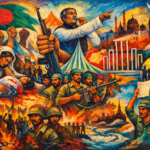India is the world’s largest democracy in terms of population, with over 1.3 billion people. Its democratic system is based on the principles of universal suffrage, free and fair elections, and a multi-party system.
While India’s democratic system has been praised for its ability to hold regular and peaceful elections, ensure the participation of diverse social groups, and guarantee fundamental rights and freedoms, it is not without its challenges. For instance, issues such as corruption, unequal distribution of resources, and social discrimination continue to pose significant challenges to India’s democracy.
Furthermore, while India is the largest democracy in terms of population, other countries have different models of democracy that may work better for their specific contexts. Therefore, it is difficult to compare India’s democracy and those of other countries directly.
Overall, while India’s democratic system has its strengths, there is always room for improvement, and ongoing efforts are necessary to address the challenges that continue to exist.
on the contrary, China is a one-party communist state led by the Chinese Communist Party (CCP), which exercises absolute control over all aspects of the country’s political, economic, and social life. Since its founding in 1949, the CCP has maintained a tight grip on power, and dissent or opposition to the government is not tolerated.
China’s authoritarian political system is based on the principles of Leninist-Maoist ideology, which promotes the primacy of the state over individual rights and freedoms. The government exercises control over the media, the judiciary, and civil society organizations, effectively suppressing any dissent or criticism of the regime.
One of the most prominent features of China’s authoritarian system is the extensive use of censorship and propaganda. The government uses the Great Firewall to block access to foreign websites and social media platforms it deems politically sensitive. Additionally, the state-run media is tightly controlled and heavily censored to ensure that only government-approved narratives are disseminated to the public.
A lack of political freedoms and human rights abuses also characterizes China’s political system. The CCP maintains strict control over civil society organizations and the media, and anyone who speaks out against the government faces the risk of persecution or imprisonment. The government has also been accused of widespread human rights abuses, including forced labour, arbitrary detention, and the suppression of ethnic and religious minorities, such as the Uyghurs in Xinjiang.
The Chinese government’s approach to governance has also been criticized for its lack of transparency and accountability. While the CCP claims to be a democratic system representing the interests of the people, it is clear that power is concentrated in the hands of a small group of elite leaders who are not accountable to the public.
Furthermore, China’s autocratic political system has significant economic implications. The government maintains strict control over the country’s economy, and state-owned enterprises dominate key sectors, such as finance, energy, and telecommunications. The government’s tight control over the economy has been criticized for stifling innovation and limiting competition, which can lead to inefficiencies and reduced economic growth.
In recent years, China’s authoritarian system has come under increasing scrutiny from the international community, particularly in light of the government’s handling of the COVID-19 pandemic and its crackdown on pro-democracy activists in Hong Kong. The government’s approach to governance has also led to tensions with other countries, particularly the United States, which has accused China of engaging in unfair trade practices and intellectual property theft.
In conclusion, China’s autocratic, dictatorial communist system is characterized by a lack of political freedoms, human rights abuses, and transparency and accountability. While the government claims to represent the people’s interests, power is concentrated in a small group of elite leaders who exercise absolute control over all aspects of the country’s political, economic, and social life. As China continues to assert itself on the global stage, its authoritarian system will likely remain a point of contention and concern for the international community.
The rest of the world has admired India for its essence of democracy, the largest electorate, and its massive and comprehensive spectrum of people from multi-ethnic races, colours and creeds conversing together to make the Indian democracy a bastion of Peoples’ Power. In contrast, China gives no power to no people but rules the communist party. Yet the world keeps quiet on China, and India faces constant Western criticism. How ironic !?







Your point of view caught my eye and was very interesting. Thanks. I have a question for you.
Can you be more specific about the content of your article? After reading it, I still have some doubts. Hope you can help me.
Thank you very much for sharing, I learned a lot from your article. Very cool. Thanks.
Your article helped me a lot, is there any more related content? Thanks!
I don’t think the title of your article matches the content lol. Just kidding, mainly because I had some doubts after reading the article.
Can you be more specific about the content of your article? After reading it, I still have some doubts. Hope you can help me. https://www.binance.info/si-LK/register-person?ref=V2H9AFPY
Can you be more specific about the content of your article? After reading it, I still have some doubts. Hope you can help me. https://www.binance.info/register?ref=P9L9FQKY
Can you be more specific about the content of your article? After reading it, I still have some doubts. Hope you can help me.
I don’t think the title of your article matches the content lol. Just kidding, mainly because I had some doubts after reading the article.
Your article helped me a lot, is there any more related content? Thanks! https://accounts.binance.info/es/register?ref=RQUR4BEO